Last Modified: 07/28/2024
Discover how ChatGPT, a cutting-edge language model, can help businesses optimize their SEO strategy.
TABLE OF CONTENTS
- What is ChatGPT?
- What is SEO?
- Is ChatGPT Good at SEO?
- Will ChatGPT Replace Google Search?
- Examples of How to Use ChatGPT for SEO
- Looking Towards the Future of SEO
- About The Experience Design Studio (XDS)
What Is ChatGPT?
Before we can understand how to use ChatGPT for SEO, it's important to first understand what it is and how it works. ChatGPT is an advanced language model created by OpenAI that has been trained on an enormous amount of text data to produce human-like responses to text prompts. It can be used to generate high-quality content for a wide variety of purposes.
A healthcare marketer in biotech might use ChatGPT not only to draft outlines of emerging technologies but also to refine their pharma SEO efforts, ensuring their content reaches the intended audience with precision.
By combining ChatGPT-generated content with human-written content, you can create content that is both informative and engaging, while also taking advantage of the strengths of both artificial intelligence and human creativity.
What Is SEO?
SEO, or Search Engine Optimization, is a vital aspect of digital marketing that involves optimizing websites and web content to improve their ranking and visibility on search engine results pages (SERPs).
Successful SEO not only helps a site to rank higher in search results but also aims to provide a better user experience, ultimately leading to increased engagement and conversion rates.
In other words, SEO is a secret recipe for success that blends various tactics and strategies to make your website more appealing and attractive to search engines.
Is ChatGPT Good At SEO?
Is ChatGPT good at SEO by itself? No. But ChatGPT can be an amazing SEO tool if you know how to use it. Integrating ChatGPT within SEO processes can enhance efficiency, but it's the human expertise that truly drives success.
There are also some areas to consider before using ChatGPT for SEO. Some of these areas include verifying accuracy, including confidential information, and AI ownership. This will be further discussed in this post.
In essence, while ChatGPT serves as a powerful starting point in the SEO workflow, from keyword research to content generation, it's the strategic and creative skills of SEO experts that elevate this initial work into effective, strategic SEO content. The collaboration between AI and human expertise ensures that the SEO efforts are not just data-driven but also empathetic and contextually relevant, which is crucial in today's evolving digital landscape.
Will ChatGPT Replace Google Search?
Some digital marketers are concerned that ChatGPT might replace Google search and the SEO industry. This is unlikely, especially in the world of healthcare marketing.
Google is the most popular search engine in the world and uses complex algorithms to index and organize vast amounts of information. In contrast, ChatGPT relies on pre-existing knowledge and data to generate responses to specific prompts. While ChatGPT can complement Google search and help automate certain tasks, it's not a general-purpose search engine like Google.
That said, ChatGPT does have the potential to affect the SEO industry by changing the way that websites are optimized for search engines. As ChatGPT becomes more advanced and capable of generating higher-quality content, digital marketers will need to adapt their SEO strategies to incorporate ChatGPT-generated content.
Examples Of How To Use ChatGPT For SEO
ChatGPT For Keyword Research
a) Brainstorming Keywords
Areas To Consider Before Using ChatGPT For Keyword Research:
- Verify the accuracy of AI tool outputs, as they may provide misleading or factually incorrect information.
- Avoid using AI tools for personal or confidential data, as AI may put this information at risk.
a. Using ChatGPT to brainstorm keywords from a seed keyword is a highly effective strategy for finding related keywords that your website may want to rank for. By inputting your main seed keyword into ChatGPT, the AI model can generate a wide range of keywords and phrases that are relevant to your website and target audience.
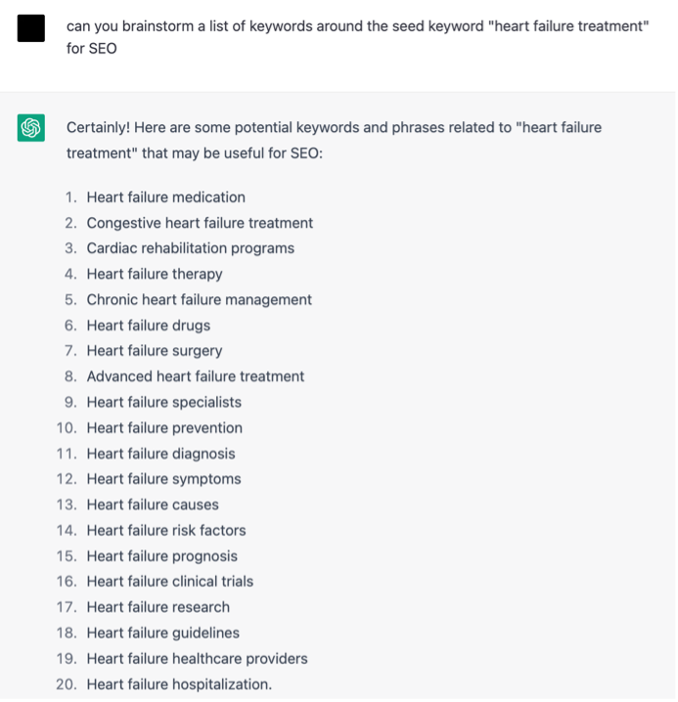
b. When working in ChatGPT always ask more questions as you get responses. Asking more questions not only helps the model to better understand the context of your query but also improves the quality and relevance of the generated responses.
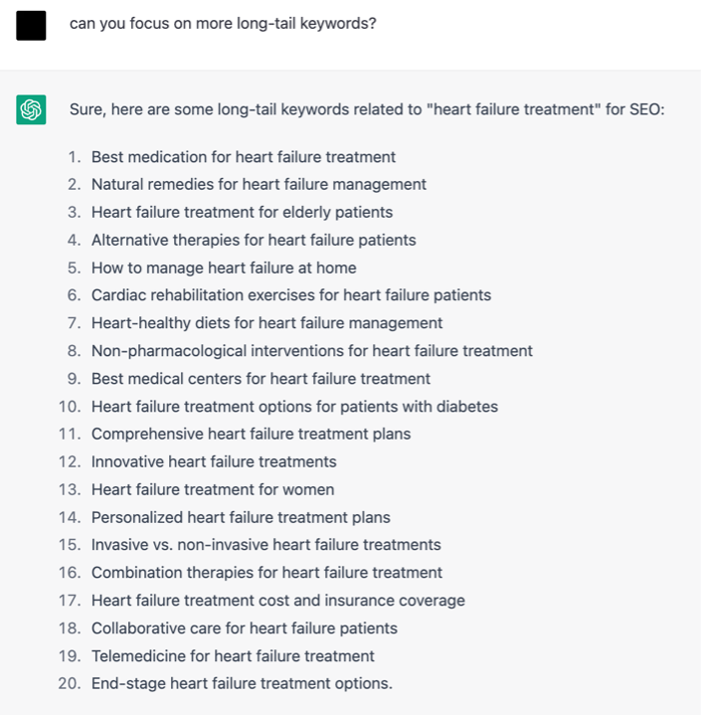
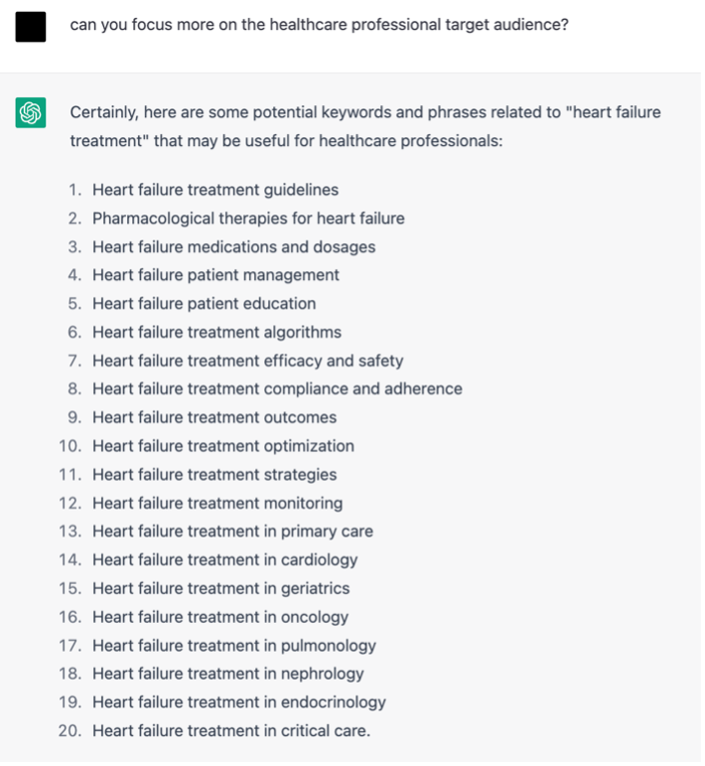
b) Finding Search Intent
a. With ChatGPT, you can uncover the true search intent behind your target keywords and develop a content strategy that speaks to the heart of your audience.
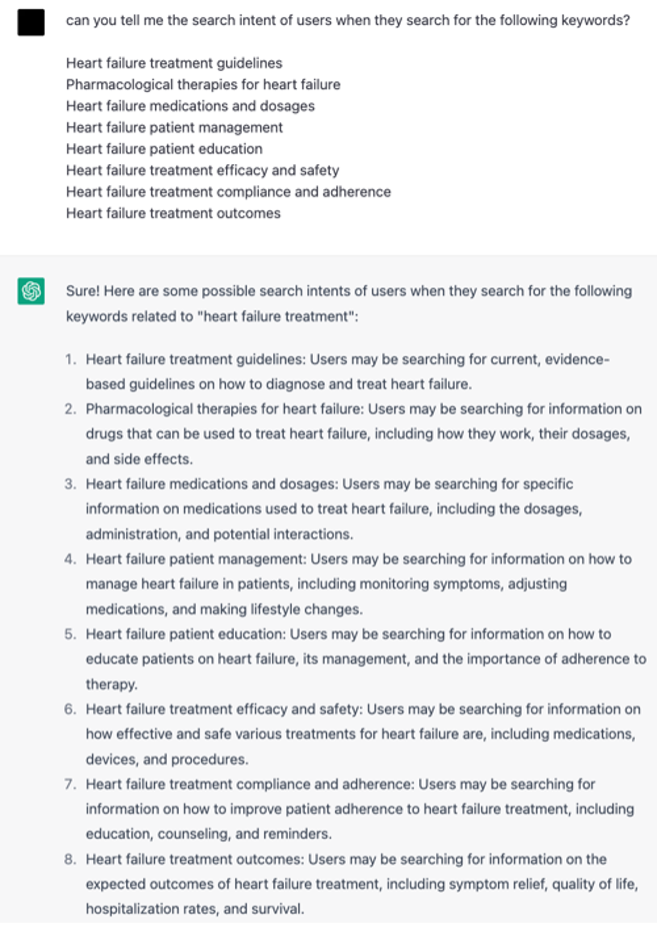
c) Cluster Semantically Relevant Keywords
a. ChatGPT can help find semantic keywords by generating a wide range of related keywords and topics that are semantically relevant to a given keyword or phrase. Using semantic keywords in your content can provide a more comprehensive answer to the user's query and increase the relevance of your website to a broader range of related search queries.
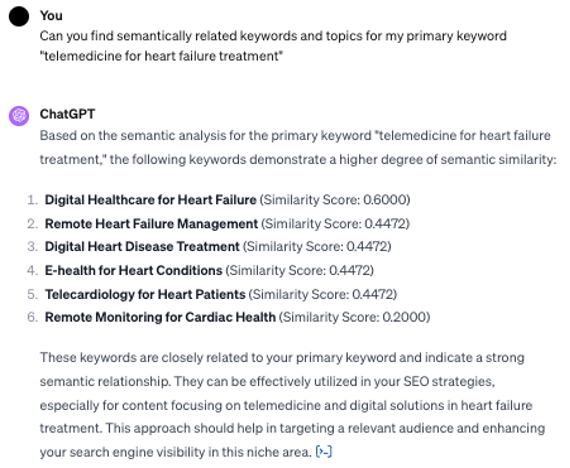
Using ChatGPT for Blog Posts
Areas To Consider Before Using ChatGPT For Blog Posts:
- Be cautious about AI-generated outputs' ownership. You may not own the output from an AI tool.
- Verify the accuracy of AI tool outputs, as they may provide misleading or factually incorrect information.
- Consider labeling creations made with AI to maintain transparency about AI usage in the workplace.
Crafting quality blog content that resonates with your audience can be a daunting task, but by using ChatGPT, you can generate topic ideas and get inspiration for your next blog post. It can also identify high-potential keywords and semantically related phrases to include in your blog post.
ChatGPT will also help you with the writing process itself. You can use ChatGPT to generate outlines or rough drafts of your blog post, which can help you structure your ideas and get your thoughts down on paper.
Ask more questions, add more context, and add more guidance to create better content. When creating content with ChatGPT you must take more of a “director” role. Continue to provide feedback to create more personalized and “human” content. Give ChatGPT the topics and insights that you want it to focus on.
Always remember to go back and edit your content to ensure that your blog maintains your unique voice. Using the same content word-for-word is never a good idea, as it can result in a loss of originality and make your content appear oversaturated with AI-generated language.
View the example below of how to use ChatGPT for blog posts.
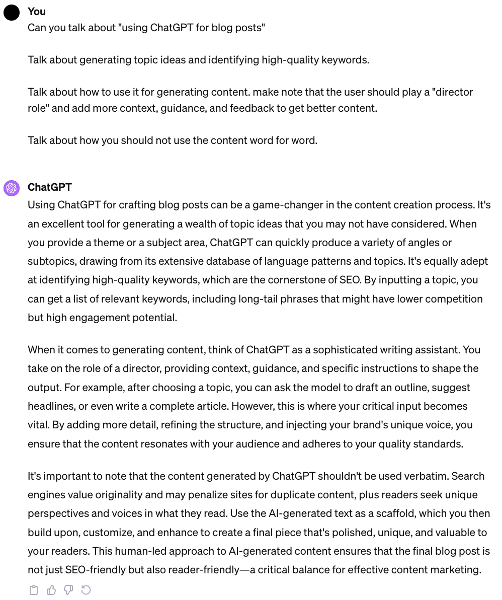
When asking for feedback, ask for different examples.
Different examples provide a range of perspectives and approaches, which can help you find the one that resonates best with your specific audience or fits the context of your project.
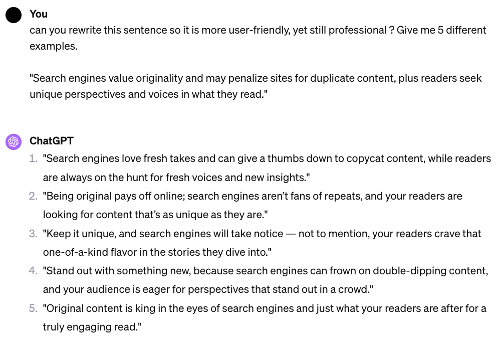
ChatGPT For Outreach Emails
Areas To Consider Before Using ChatGPT For Blog Posts:
- Avoid using AI tools for personal or confidential data, as AI may put this information at risk.
- Consider labeling creations made with AI to maintain transparency about AI usage in the workplace.
Crafting outreach emails for SEO can be an intimidating task, but ChatGPT can be your secret weapon in creating effective and personalized messages. ChatGPT can help you generate outreach emails that not only grab the attention of your prospects but also align with their interests and needs.
Using ChatGPT for outreach emails can help you save time and effort while increasing the chances of your messages being read and responded to.
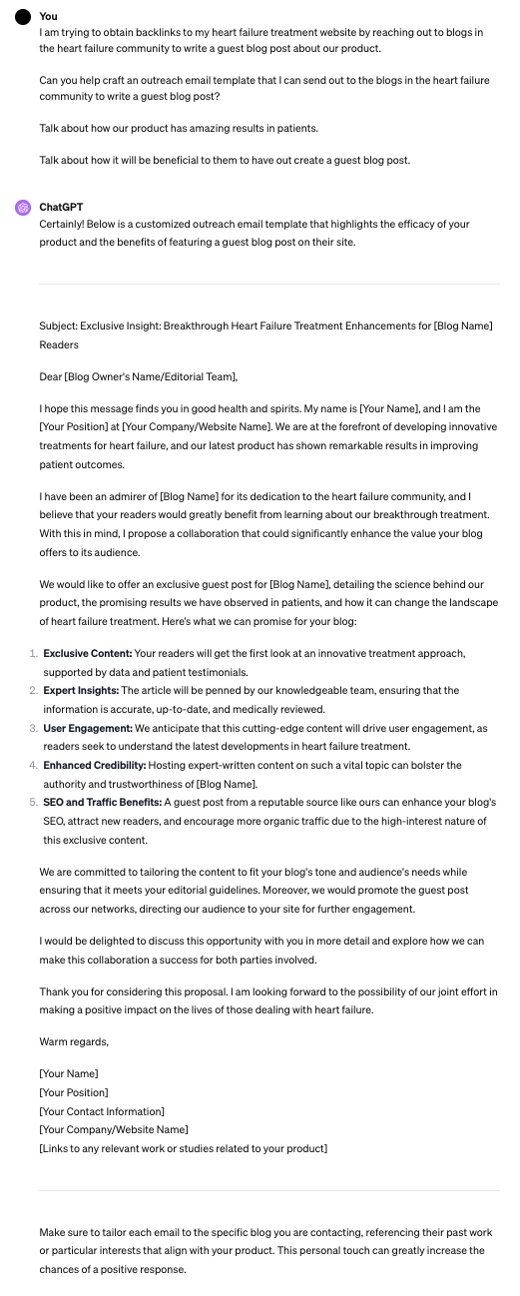
Ask for revisions so your tone is included.
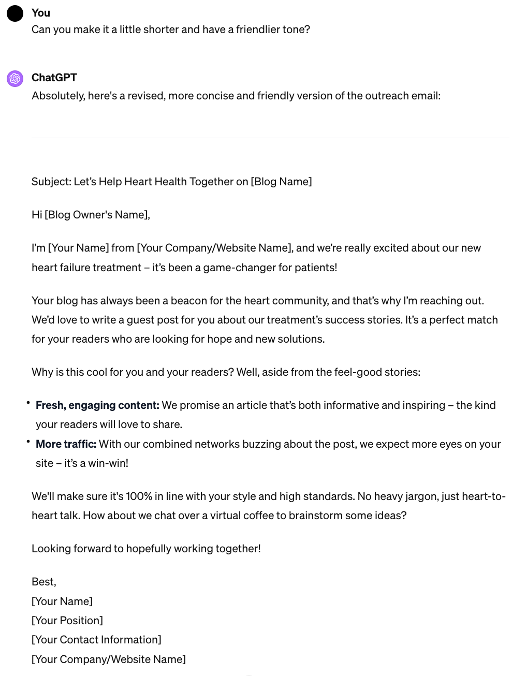
Looking Toward The Future Of SEO
As we look toward the future of SEO, the integration of AI tools like ChatGPT promises to redefine the landscape of digital marketing. The evolution of SEO is expected to witness a shift from keyword-centric content to a more intent-focused approach, where user experience and content relevance take center stage.
In essence, the future of SEO will be characterized by a symbiotic relationship between human expertise and AI innovation, driving the industry toward more targeted, effective, and user-centric marketing strategies. As this technology advances at a fast rate, it becomes even more important to have AI visibility as early as possible. Utilizing ChatGPT for SEO is a must for healthcare marketing.
About the Experience Design Studio
The Experience Design Studio is an award-winning digitally native customer experience agency founded in 2017 by two agency veterans, bringing their collective creative, user experience, marketing, technology, and healthcare expertise together. Are you looking for SEO services? XDS is a full-service digital agency providing strategy to creation, consulting, design, engineering, marketing, and analytics, with the aim of providing seamless customer, patient, and HCP experiences across all digital touchpoints, with common sense sprinkled in.
